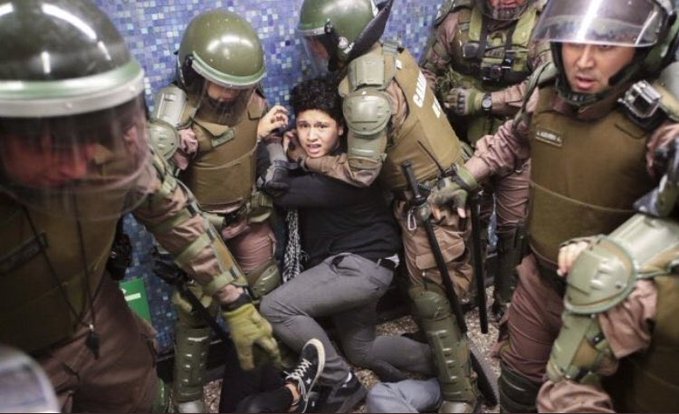
The Office of the UN High Commissioner for Human Rights (OHCHR) said in a report published Dec. 13 that international human rights norms had been violated by both police and army personnel during the recent mass protests in Chile which led the government to declare a state of emergency. The report said that these rights violations should be prosecuted. The 30-page report, based on research during the first three weeks of November, extensively details multiple allegations, including of torture, and rape and other forms of sexual violence, against people held in detention. The leader of the OHCHR mission in Chile, Imma Guerras-Delgado, told journalists in Geneva that the overall management of demonstrations by the police “was carried out in a fundamentally repressive manner.”
When a student protest in October over transit prices turned into a nationwide movement against the government, peaceful demonstrations swept across the country. Although the great majority of detainees have now been released, official figures reveal that more than 28,000 people were arrested between Oct. 18 and Dec 6—many arbitrarily.
The research team conducted 235 interviews with victims and 60 more with police officers, including some of those injured during the protests. “The police have regularly failed to distinguish between people demonstrating peacefully and violent protesters,” the report found.
Moreover, it documented 113 specific cases of torture and ill-treatment, and 24 cases of sexual violence against women, men and adolescent girls and boys, perpetrated by members of the police and army, while noting that the National Human Rights Institution (INDH) had filed criminal complaints relating to hundreds of other such cases.
Citing Ministry of Justice figures, the OHCHR report found that up to Dec. 10, nearly 5,000 people were injured, including nearly 2,800 police officers—but OHCHR noted that other sources had indicated higher numbers had suffered injuries.
Citing some 350 people with injuries to their eyes or faces, the report said that “alarmingly high number…provides a strong basis to believe that ‘less-lethal weapons’ have been used improperly and indiscriminately, against international principles on minimizing the risk of injury.” It noted that while eye injuries mainly resulted from shotgun pellets, some cases were “due to the use of chemical irritants, in particular tear gas and, in some instances, from impacts from tear gas canisters.”
Pointing out that the authorities “had information regarding the extent of the injuries as early as 22 October,” the report maintained that those responsible failed to adopt timely measures to stop the use of less-lethal weapons. “Prompt action by the relevant authorities could have prevented other people suffering serious injuries,” it stated. (UN News)
Photo: KaosEnLaRed





Chile passes law ‘protecting’ police
Days after the OHCHR report was released, President Sebastian Pinera submitted a bill to congress that would stiffen penalties for attacks on the security forces, making it an “aggravted” crime. A total of 26 have been killed since the protests began two months ago. (NYT, Dec. 16)